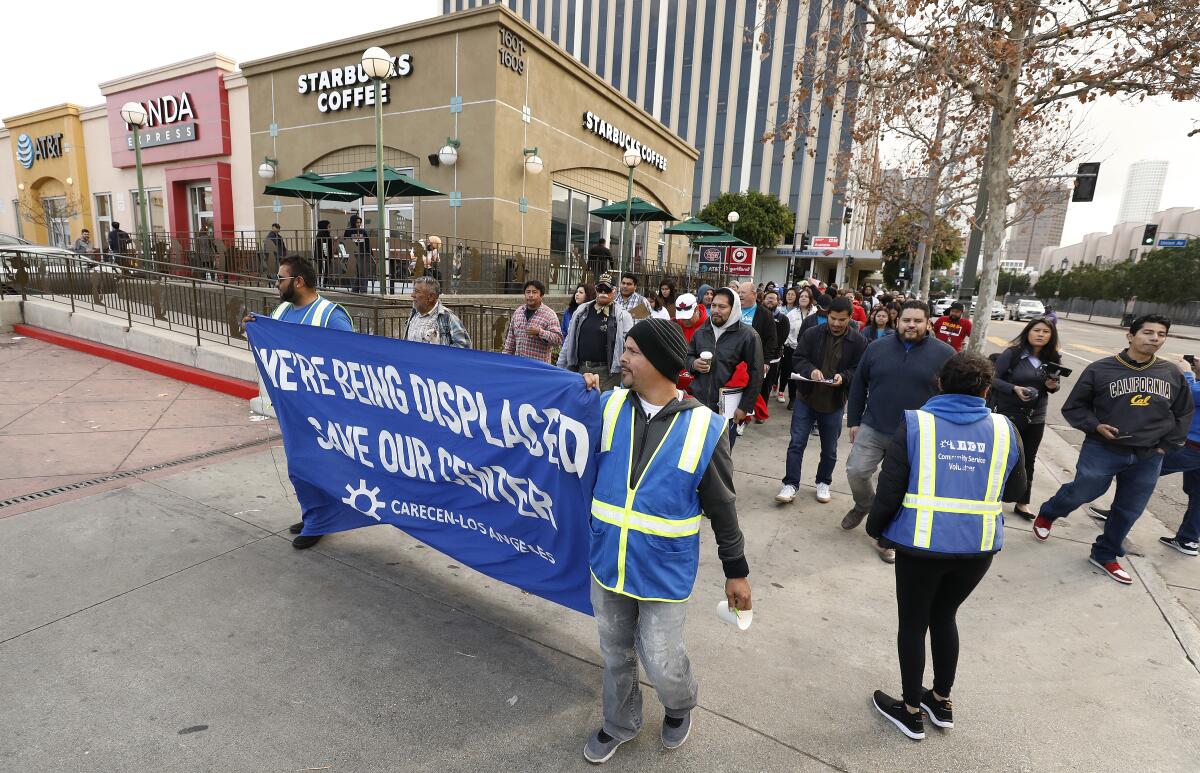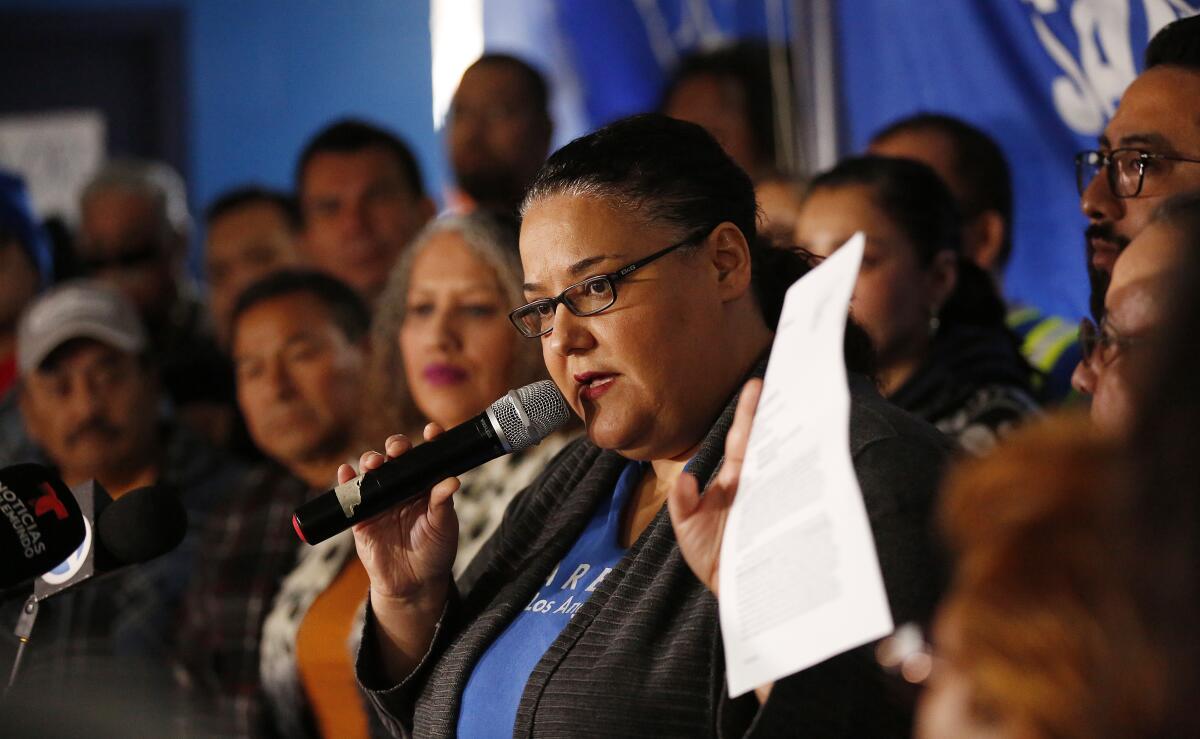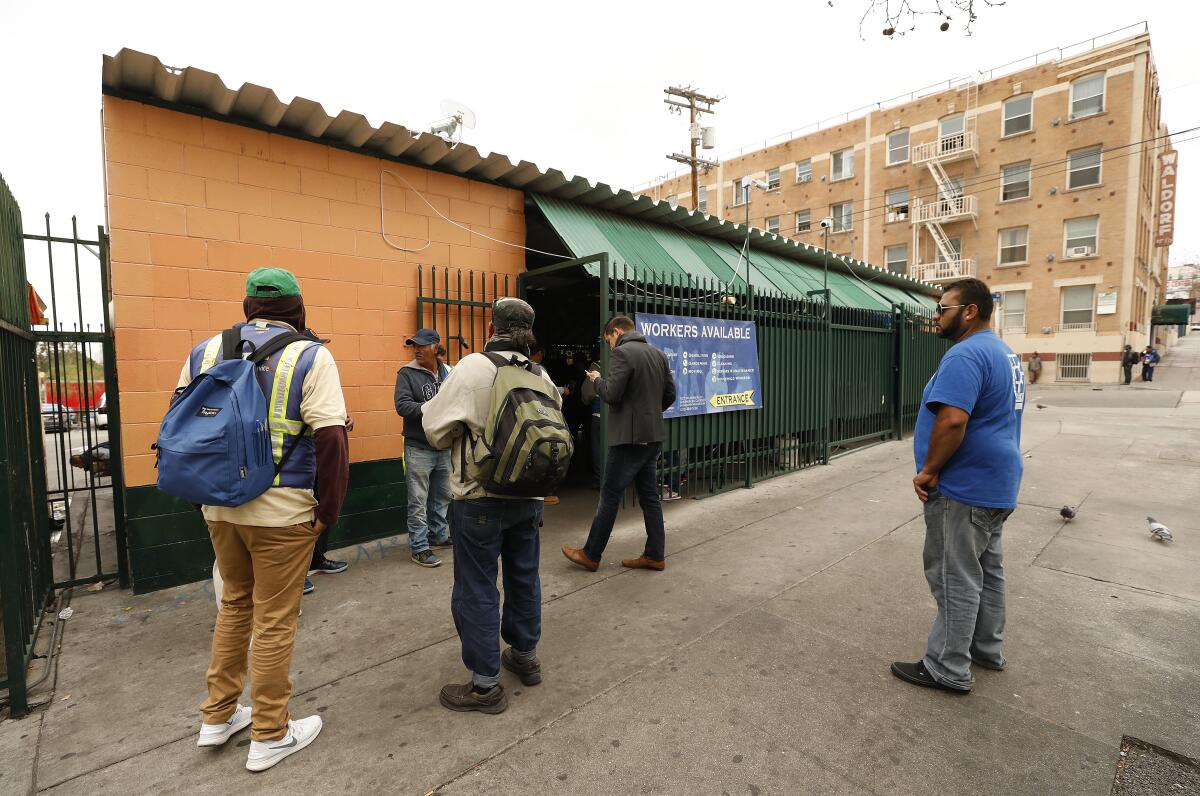Day labor center in Westlake fights eviction, arguing it is ‘safety net’ for community

- Share via
Eight days before Christmas, a day labor center in the Westlake district of Los Angeles received an eviction notice.
According to the landowner, the site has become a “nuisance” and a “blight.” As a result, the organization that runs it has been given until mid-January to vacate.
But the Central American Resource Center, or CARECEN, the 37-year-old nonprofit organization that runs the day labor center, plans to do no such thing.
CARECEN founded the Day Labor Center in 2004, strategically placing it in a strip mall parking lot, just a rock’s throw away from a Home Depot. There, day laborers — the vast majority of them Latin American immigrants — can stop by to use the restroom; get safety and computer literacy training; and receive assistance to address wage theft, among other services.
In a letter issued to CARECEN, the landowner, Wilshire Union Center, alleges that: “Numerous photos, videos, and first-hand accounts have revealed an alarming amount of illegal alcohol and drug use” on the property.
The missive also cites “public urination, vandalism, theft, and, most worryingly, threatening behavior” towards the strip mall’s customers and employees.
The company attributes the conduct to “individuals who appear to be applicants to the Day Labor Center” and demands that the organization vacate the property by Jan. 17.
Instead, CARECEN responded by hosting a rally on Thursday, inviting day laborers who’ve benefited from the resources offered at the center to share their experiences.

CARECEN’s executive director, Martha Arevalo, who took part in the rally, said that the eviction notice came without warning and that it offered no suggestions for improvement.
She said she also believes it’s unfair and counterproductive to blame the activity in the parking lot on the center. With what she described as “the housing crisis in Los Angeles and the anti-immigrant crisis across the United States,” she added, “right now is not the time to be closing our center.”
“We’re actually part of the community’s safety net,” she said. “If anything, the Day Labor Center mitigates some of the landlord’s complaints. We allow the workers to use the restroom. We facilitate the hiring process to ensure fair wages. We’re the reason why there aren’t more people living in those encampments across the street from the parking lot.”
In response to a request for comment, attorney Geoffrey Gold, who is representing Wilshire Union Center, shared a letter with The Times, addressed to Los Angeles City Councilman Gil Cedillo on Dec. 17.
In it, Gold outlines the same concerns noted in the eviction letter. He also adds that the landowner’s “willingness to support charitable organizations benefiting the community remains steadfast” and “invites [Cedillo’s] office to assist in identifying or proposing another charitable organization that may make use of the property without fostering or permitting the criminal and hostile activity that Wilshire Union has been exposed to.”
The landowner, he adds in the letter, “would be happy to consider offering the space previously occupied by CARECEN to such a better, managed and responsible organization.”
Rigo Torres, a 63-year-old immigrant from El Salvador, was among the workers who took part in Thursday’s rally. Clad in a blue and neon green vest, he carried a clipboard and gathered signatures for a petition that will be presented to the landowner and city officials.
Torres has lived in Koreatown for 45 years and has worked in roofing for decades. The center is a reliable source of support in his otherwise unpredictable routine. “I wake up at 5 a.m. every day,” he said. “By 6:30 a.m., I’m out here, not knowing if I’ll find work. There is no guarantee.”

The CARECEN Day Labor Center, Torres underscored, has helped him to resolve several incidents of wage theft. He used that money to put food on his family’s table and to help put his three children through school. One of them graduated from UC Berkeley.
On Thursday afternoon, Arevalo met with Cedillo’s staff. CARECEN, she said, hopes that Cedillo can help facilitate a meeting in which the landowner and the organization can address their concerns.
“Maybe one restroom is not enough,” she said. “All right, then. Let’s talk. Maybe we need two. Let’s look for solutions.”
Conrado TerrazasCross, who serves as the councilman’s communications director, said that his office is “doing everything it can” to keep the day labor center at its current location.
But should the landowner decline to come together to find a solution, Arevalo added, CARECEN is prepared to take action. “Everything is on the table,” she said.
Following the rally on Thursday, day laborers and their supporters marched around the block on which the property is located, making their way up Union Avenue and across Wilshire Boulevard.
Marlon Aguilera, who came to the center after living on the street for six months, helped lead the way.
When he lost his restaurant job, he said, he lost everything, including his apartment in Rancho Cucamonga. Ultimately, he wound up sleeping in MacArthur Park, where he was assaulted three times.
Hoping to earn some money, he made his way over to Home Depot in Westlake. But “no one would hire me,” he said, “because of my appearance.”
Noting his predicament, a fellow worker recommended that he go to the day labor center.
“They gave me coffee. They gave me bread. And they gave me a clean set of clothes,” said Aguilera, a native of Honduras who has lived in the United States for 15 years. The center, he added, also provided him with a workshop on mental health, something that enabled him to pull himself out of his self-destructive state.
“Why don’t I want this center to be shuttered?” Aguilera asked. “Because I don’t want anyone else to go through what I did.”
More to Read
Sign up for Essential California
The most important California stories and recommendations in your inbox every morning.
You may occasionally receive promotional content from the Los Angeles Times.











